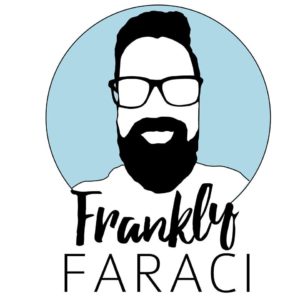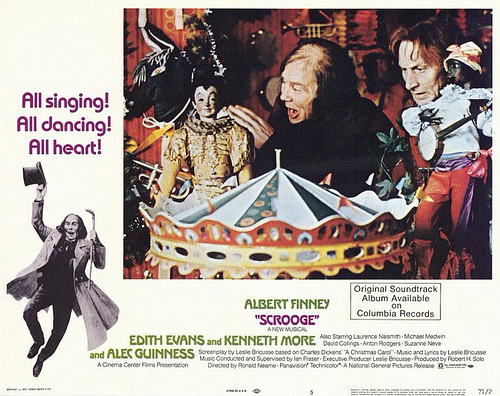Here at Reel World Theology, we’ve started to cross paths with a lot more creators in the entertainment business. Faithful people making original content in every medium including podcasts (naturally), videos, books, movies, and TV shows. As more opportunities have begun to present themselves, we felt it would be great to start sharing these conversations more often and help you, the wonderful readers and listeners, to grow in your appreciation of those making powerful stories and ensuring your entertainment is never mindless.
Recently, through the enterprising connections of contributor Daniel Melvill Jones, I got a chance to talk with Matthew Faraci from the new Dove Channel show Frankly Faraci. I was a bit skeptical by The Dove Channel’s purpose of putting out, “safe, family-friendly” content, but having seen the first episode of Faraci’s interview-style TV show and sitting down to talk to him, I was surprised by his self-deprecating humor, convictions, and passion to show how people of faith are seeking to do good in different spheres of public life. The following is our conversation which gets a chance to dive into the show before I start reviewing episodes next week. 
Josh: Can you tell us a little about yourself, your family, and your background?
Matthew: I had this interesting background in my life. I spent a lot of time working in politics. Actually, one of the reasons I was working in politics…was my mom was an activist. We were raised with this sense of wanting to do good in the world and wanting to affect things in a positive way. That bled into really now the sphere that I am focused on is culture. And I don’t think you have to ask anybody about where the culture’s at, on any side of any issue, to see that people are unsatisfied with where the culture is at. And particularly the negativity, which by the way, people of faith don’t have any special dispensation to not be negative; I see as much negativity coming from our side, sometimes. Frankly Faraci attempts to be a part of that solution.
Could you share a little bit about the story of how ‘Frankly Faraci” got started and the purpose behind the show?
Matthew: Well, the purpose of the show is faithful people doing extraordinary things. So, we find that are doing amazing things in the world that are well known, if they are not well known it’s hard to tell their story. We interview them in a setting where they feel real comfortable and organic and that way you can have an authentic conversation. The throughline with all of these folks is their faith is what makes them do this, that’s the driver, it’s the motivator, it’s what animates them. It’s why they are doing what they are doing.
The way the show came about is kind of interesting, I think it is a great testimony to what God can do if you are following His plan and not your own plan. I was speaking at a summit called “Purpose” which is put on by Variety magazine. I was moderating a panel and I was doing two things when I moderated that panel. I put a lot of work into it and I prayed a lot. For me, it is important everything I do has excellence. Everything we do is a reflection of God and so everything we do, whether we think it is important or not, we should do it with excellence. The apostle Paul says you are working for the Lord, not for man. I was really approaching that panel in that way. Some of the executives from Dove Channel saw that and said, “Hey! That would be a great, original show.”
Now the reason I say that is how God works is because if you go out on any street corner in Los Angeles and throw a rock, you will hit twenty people who are trying to pitch a show. I wasn’t pitching a show at all, in fact, it wasn’t even in my mind. That’s sort of what came out of doing something with excellence. So I always tell young people, no matter what you are doing, no matter how minor you think that thing might be, do it with excellence. Not because someone’s going to notice you, but that’s what we’re called to do.
That’s a pretty intimidating panel. I’d be praying to not screw up and to have something important to contribute.
Matthew: [laughs] You’d be surprised that a lot of people will go up and wing it. They have such a big opportunity on a big platform and they wing it. But that is one of the big epidemics, I think, in the world, not just the faith community, is people not doing things with excellence and not caring about the details and saying, “it’s good enough.”
The first episode of the show interviews ‘The Piano Guys’, and seem like a really down-to-earth, kind group of guys. What are some of your takeaways from interviewing them and is there anything that captured your attention about them that didn’t make it into the episode?
Matthew: Well, kinda the point of the show is I am not interviewing those people but you are there with me. The way it is shot is you are a fly on the wall just watching this conversation. The Piano Guys, I was amazed by their warmth, their passion, and one of the things is how important their faith is to them. You see thatIf you watch their videos, for example, Steven Sharp Nelson, their cellist, when you see him playing the cello he has joy on his face. You see the joy he has when he is playing. It was amazing to discover the reason for that joy. You see it as a hint and you are like “aha” I have a guess about you because I know where joy comes from and it was great to see that validated. And, to your point, how grounded they are. And I think faith is the only thing that will ground you. No matter how big you are, no matter how famous you are, you don’t get it a big head because it’s from Him not from you.
Yeah, which can be a struggle and hard enough when [we aren’t famous].
Matthew: Right. Absolutely.
So, ‘Frankly Faraci’ is a part of The Dove Channel, which creates and curates content to be family-friendly and what it calls a “safe walled-garden”. How do you see ‘Frankly Faraci’ lining up with this vision?
Matthew: The reason I see it as a fit is Frankly Faraci is fundamentally a show for the whole family and Dove Channel is a network for the whole family. I want everyone to be able to watch these interviews together. Use the example of The Piano Guys or Studio C.
Right, which debuted on April 4th.
Matthew: Right, right. Both of them have huge audiences of young people who love them. I know a lot of young people who picked up a classical instrument because of the Piano Guys. What I really want to do is highlight people who are actual role models. Who kids can look up to and kids can say, “Hey mom, dad, I love that.” Studio C, it’s so funny, they were on Conan a couple weeks ago. They were on because of Conan’s kids, and all his kids’ friends, are fans of Studio C. They were literally like, “Dad, you have to watch these guys,”. So, that’s why I am interviewing people that are for the whole family and can be seen by the whole family.
The other interesting thing about Studio C though, is that because everything they d is family-friendly it makes for better comedy. One of the things I said to you before the interview is SNL wishes is what Studio C. I sincerely mean that. Having been a former stand-up comedian, a very failed stand-up comedian, but a stand-up comedian nonetheless, I can tell you that keeping it clean is the absolute hardest thing to do in comedy. Cheap jokes, sex, and bad humor is an easy way to get laughs. Real talent can keep it clean. I would challenge Saturday Night Live to be able to do an entire episode and be family-friendly. I don’t think they are capable of doing and be funny.
Also, how would you respond to someone who might not entirely agree with this vision and see this as possibly too restrictive or ignoring the culture at large, which often isn’t always a “safe” place?
Matthew: We’re going into the culture at large.The idea is to find people who are famous and have a faith background. Just like the Piano Guys, they’re not famous because they’re faithful guys, they’re famous because they’re awesome. Right? And so, we are really reaching the culture and interviewing people who are doing great things and they happen to have a faith background. The objective is to go out and find excellence for a very particular reason. People of faith have this stereotype in culture as judgemental, angry, do-gooders, Ned Flanders types. That is a fundamental, false stereotype and so I wanna smash that stereotype.
The final episodes to come out is going to be an interview with Propaganda, someone I personally really like. I wish I could get my kids to like good rap music. Could you share some of your other upcoming guests or is there anything you can tell us about what is coming down the pipe for ‘Frankly Faraci’?
Matthew: Like Jesus at the wedding of Cana, we are saving the good wine for last. Propaganda, he is so special. I wanna share a quick story with you about him. I go to a Barbershop on Melrose Avenue in Los Angeles, where I live. Melrose Ave, not exactly a faith-driven street. Lots of gritty, urban, hipster stuff. It’s Melrose, it’s a scene. The guys in there, they’re young, they’re hip, they’re not me. I have real conversations with them about faith. One of the things they have in their is this giant speaker and they play all kinds of music. And one day I pulled out my iPhone and asked them, “hey guys, can I try something?” and they said, “sure.” I put on some of Propaganda’s music. Not only did they love it musically, they loved what he had to say. They heard he had a cause. And one reason it touched me is I am not one of those people who can reach those guys, but Prop is. I love that about him. When I first discovered him a couple years ago he was amazing. He’s authentic and real.
Bono said that the problem with Christian art is too clean. Not that he meant that clean is bad, but about how faith can address your bad marriage and the real, gritty stuff of life. Authenticity. Propaganda oozes authenticity. Such a privilege to sit down with him, it was amazing.
Thanks so much, Matthew, for taking time with me to share a little bit of insight into your show and some of your guests.
Matthew: Thanks, again, and we’ll talk soon.


1 comment